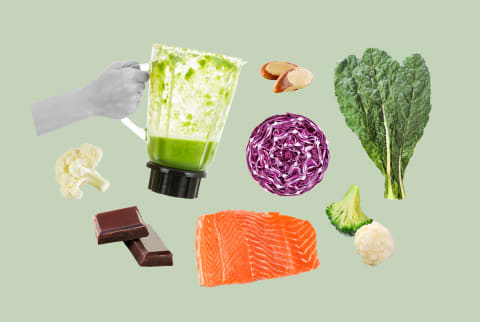Ultimately, all of the various nuances of diet that are designed to target a specific organ system share two fundamental goals: 1) reducing inflammation, and 2) nurturing our gut microbes. So how do these two ideas play out in terms of what yours truly decides to eat? I’ve actually been covering this subject quite a bit lately on Instagram, with the recent launch of my Summer Brain Challenge on Instagram. If you follow along, you’ll notice that the first order of business on Day One involved getting more anti-inflammatory foods into your diet. That’s because, as it turns out, food choices that target inflammation are typically synonymous with food choices that nurture the microbiome. Keeping these two goals in mind helps simplify the process of deciding what to eat, and thus, I eat a diet that dramatically limits sugars and refined carbohydrates, celebrates the salubrious qualities of healthful fat, and is rich in fiber. Here, let me walk you through what I might eat on any given day. Our evening meal features mostly vegetables with as wide a variety of colors as possible. We always include a selection that’s rich in gut-friendly prebiotic fiber like onions, leeks, or dandelion greens (which are rich in a type of prebiotic fiber called inulin), as well as something cruciferous like kale, broccoli, cauliflower or cabbage. As often as we can, we try to select produce for these sides that is in season, so as to keep our nutritional intake diverse and our ingredients fresh. Importantly, most of my plate is taken up by vegetables while the protein component, which might well be a vegetable like black beans, is more of a side dish. Speaking of protein, that might also come from wild fish like salmon, cod, or sablefish. Or we might have grass-fed meat or free-range chicken. Fatty fish, like salmon and sardines, are a particularly great choice for brain health, as they contain relatively high levels of the omega-3 DHA, which is powerfully anti-inflammatory and associated with reduced Alzheimer’s risk and improved depression symptoms. We do our best to finish our evening meal early enough as to allow for at least two to three hours of digestion before going to bed, which helps ensure a sound night’s sleep—that crucial period of rest when your brain is able to clean house and assimilate and integrate new information. For more nutritional tips from Dr. Perlmutter’s Summer Brain Challenge, you can follow along on his Instagram account @davidperlmutter.



